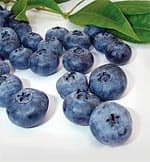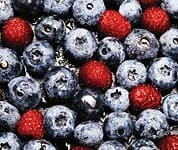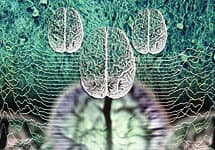Life Extension Magazine®
When it comes to brain protection, there is nothing quite like blueberries,” according to James Joseph, PhD, lead scientist in the Laboratory of Neuroscience at the USDA Human Nutrition Research Center on Aging at Tufts University. “Call the blueberry the brain berry,” says Dr. Joseph.1 Dr. Joseph’s claim was made with the publication of his landmark blueberry research. It has since been bolstered by animal studies demonstrating that daily consumption of modest amounts of blueberries dramatically slows impairments in memory and motor coordination that normally accompany aging. Moreover, a wealth of exciting new research clearly establishes that in addition to promoting brain health, this long-prized native North American fruit—whether consumed fresh, frozen, canned, or as an extract—may confer a range of diverse health benefits. After testing 24 varieties of fresh fruit, 23 vegetables, 16 herbs and spices, 10 different nuts, and 4 dried fruits, the US Department of Agriculture determined that blueberries scored highest overall in total antioxidant capacity per serving. As most health-conscious adults are aware by now, antioxidants are vital in countering free radicals, the harmful byproducts of cellular metabolism that can contribute to cancer and other age-related diseases.2 Separate studies show that blueberries may help to lower blood cholesterol,3 promote urinary tract health, and reduce the risk of urinary infections.4,5 Studies in Europe have documented the relationship between consumption of bilberries (the blueberry’s close European cousin) and eye health, highlighting the berries’ ability to improve night vision, halt cataract progression, and protect against glaucoma.6 New studies also support blueberries’ ability to reduce age-associated lipid peroxidation,7 a contributor to cardiovascular disease, and to suppress the growth of several types of cancer cells,8,9 suggesting that blueberry phytochemicals may well play a future role in human cancer treatment. And you can add to the manifold health benefits of blueberries at least one more reason to eat them daily: virtually everyone agrees that they are delicious.
When the Plymouth colonists arrived in what is now Massachusetts, native American inhabitants shared with them the blue-tinged fruit of a low woody shrub whose calyx forms a delicate five-point star. For centuries, native American cultures had consumed “star berries” not only as food but also as medicine, drinking blueberry juice to relieve coughs, brewing a tea from blueberry leaves as a tonic, and eating fresh, dried berries to sharpen their vision.10 Blueberries and bilberries belong to the genus Vaccinium, which includes more than 450 plants grown in all parts of the world. Members of the Vaccinium genus possessing the darkest-colored fruits appear to provide the greatest health benefits, a fact that scientists attribute to the compounds that give the plants their dark pigmentation. These bioflavonoids include anthocyanins and their precursor, proanthocyanidins, both of which are voracious scavengers of free radicals.11,12 Research demonstrates that blueberry consumption boosts serum antioxidant status in humans.13 Elevated antioxidant levels in the body may protect against damage to cells and cellular components, thus helping to reduce the risk of many chronic degenerative diseases.13 How Blueberries Combat Brain AgingIn Dr. Joseph’s groundbreaking work at Tufts, 19-month-old laboratory rats—the equivalent of 60- to 65-year-old humans—were fed dried blueberry extract at a dose the investigators calibrated to be the human equivalent of one-half cup of blueberries per day. Three other groups of rats received spinach extract, strawberry extract, or a control diet. After eight weeks on the regimen, the investigators evaluated the rats—now equivalent in age to 70- to 75-year-old humans—using various tests of memory function.
Compared to a control group fed only a standardized diet, each of the three supplemented groups performed at least marginally better on memory and learning tests.14 In tests of neuromotor function, however, the blueberry-fed rats significantly outperformed the other groups. These rats were much better able to walk the length of a narrow rod and balance on an accelerating rotating rod compared to the other groups. This was indeed a stunning finding, as scientists have for some time tended to accept as established fact that age-related neuromotor dysfunction is irreversible. Dr. Joseph’s findings appear to flatly contradict this notion. Blueberry extract, he discovered, was clearly capable of reversing this particular aging process as no other agent had ever been demonstrated to do. Dr. Joseph concluded: “This is the first study that has shown that dietary supplementation with fruit and vegetable extracts that are high in phyto-nutrient antioxidants can actually reverse some of the aging-relatedneuronal/behavioral dysfunction.” 14 Dr. Joseph’s blueberry-supplemented rats also demonstrated improved learning and memory skills as they navigated mazes and found—and then remembered—the location of an underwater platform on which they could rest from swimming. When Dr. Joseph and his colleagues examined the brain tissues of these rats in vitro, they found that dopamine levels were much higher than in the brains of rats in the other groups. Dopamine is an essential neurotransmitter that enables smooth, controlled movements as well as efficient memory, attention, and problem-solving function. Dr. Joseph speculated that blueberry extract might also increase brain cell membrane fluidity while reducing levels of inflammatory compounds, thus slowing the brain’s normal aging process.14 To other researchers, Dr. Joseph’s study seemed especially promising in its implications for aging humans. Older adults tend to fall or stumble—sometimes with catastrophic consequences—because their brains become less adept at monitoring and modulating swaying motion, as conduction of neural signals in the brain slows with aging. Older people likewise tend to suffer memory loss and an inability to learn new behaviors in ways that can starkly limit their ability to lead productive, satisfying lives. “People are told once you’re old, there’s nothing you can do,” noted Dr. Joseph’s colleague and study coauthor Dr. Barbara Shukitt-Hale. “That might not be true.”15 New Studies Confirm Brain BenefitsDr. Joseph’s findings not only spurred scientific research into the health properties of blueberries, but also greatly increased public awareness of this remarkable fruit. Five important new studies support and expand on Dr. Joseph’s original research. In a 2005 article published in the journal Neurobiology of Aging, Rachel Galli and her colleagues, also based at Tufts, reported discovering a specific mechanism by which blueberries help reverse the neurological aging process.16 The Galli study—which included Drs. Joseph and Shukitt-Hale as co-investigators—sought to measure the heat-shock protein response in the brains of both young and aged rats supplemented with blueberry extract compared to a control group of aged rats. A protective mechanism produced in the brains of most animals (and humans), heat-shock proteins fight free radicals and inflammation-inducing agents, acting similarly to antioxidants to support healthy brain tissues. As people age, however, their ability to generate heat-shock proteins in sufficient quantity declines,17 sometimes dramatically. The Tufts researchers sought to determine whether blueberries could help restore the heat-shock protein response in rats.16 After 10 weeks, the scientists subjected brain tissues from the rats to an inflammatory challenge and then measured the subsequent heat-shock protein response. As presumed, the brains of young rats that had consumed blueberries produced a strong heat-shock protein response, unlike the brains of the aged rats that did not consume blueberry extract. The significant finding, however, was that the brains of aged rats fed blueberries were as successful at initiating the heat-shock protein response as the brains of young rats. The blueberry extract proved capable of entirely restoring the heat-shock protein response in the test animals, suggesting that blueberries may protect against neurodegenerative processes associated with aging.16 Last year, the journal Nutritional Neuroscience published an important new study by scientists at the University of Barcelona. The Spanish researchers previously had demonstrated blueberries’ effectiveness in reversing age-related deficits in neuronal signaling. They now sought to determine whether the active phytochemicals that give blueberries their significant neurological benefits do indeed cross the blood-brain barrier. Examining the brains of rats that had been fed blueberry extract for 10 weeks, they were able to isolate blueberry-specific agents in the rats’ cerebellum, cortex, hippocampus, and striatum—brain areas that control memory and learning processes. Most striking, the scientists were able to correlate the presence of blueberry phytochemicals in the rat brain cortices they examined with improved cognitive performance in tests initiated at the end of the 10-week supplementation period.18
Blueberries may also prove capable of helping humans whose brains have been damaged by a loss of blood flow and the critical oxygen and nutrients it provides, a condition known as ischemia (one of the two principal causes of stroke). In a May 2005 study published in the journal Experimental Neurology, researchers documented how three groups of rats whose diets were supplemented with blueberries, spinach, and spirulina, respectively, all suffered less brain cell loss and were better able to recover lost function following artificially induced ischemia than rats in a non-supplemented control group. At autopsy, the scientists observed that the physical extent of ischemic damage to the brains of rats that had been fed the three supplements was significantly less than that suffered by the control group.19 Similarly, the Tufts scientists who have been in the forefront of blueberry research reported an additional study in the August 2005 issue of Neurobiology of Aging. In this study, they demonstrated that the auditory processing speed of aged rats supplemented with blueberries nearly matched the lightning-fast auditory processing speeds of young rats, while the speeds of a control group of non-supplemented aged rats were dramatically slower. According to the researchers, “These results suggest that the age-related changes in temporal processing speed in [the primary auditory cortex] may be reversed by dietary supplementation of blueberry phytochemicals.”20 Another recent study suggests that blueberries may have applications in the developing field of neural transplants, which many neuroscientists believe hold promise as a means of replacing vital brain structures destroyed or damaged by brain injury or degenerative disease. Unfortunately, the survival of transplanted tissue is often poor, especially in older recipients. When researchers gave blueberry supplements to middle-aged rats receiving neural implants, the growth of their hippocampal grafts was markedly more vigorous than that of identical grafts in a control group, and cellular organization was comparable to that in tissue grafted into young laboratory animals. Blueberries may someday play an important role in ensuring that surgically grafted tissues thrive in the new host, where they may help to restore lost motor and cognitive functions.21 | ||||
Blueberries
Benefits for Other Body Systems
Blueberries’ benefits for neurological health and vigor are so well established as to make daily consumption of the fruit a “no-brainer” for virtually everyone. Moreover, new studies continue to confirm blueberries’ remarkable health-promoting effects in other areas of the human body.
For decades, researchers in Europe have documented evidence of the ability of bilberries to combat a range of eye disorders. During World War II, French researchers who examined bilberry extract’s effects in pilots found that bilberry helped improve nighttime visual acuity, adjustment to darkness, and recovery from glare.6 In another study, all eight patients with glaucoma who were given a single oral dose of bilberry extract demonstrated improvements based on electroretinography, a measure of electrical responsiveness of the retinal cells. Bilberry’s antioxidant properties may protect against glaucoma by supporting healthy intraocular pressure.6 In a clinical study, the combination of bilberry extract with vitamin E stopped the formation of senile cortical cataracts in 48 of 50 patients.6 Researchers believe that the anthocyanins and proanthocyanidins found in blueberries might similarly offer benefits for eye health.
In an article in the Journal of Agricultural and Food Chemistry in 2004, researchers announced that they had isolated three compounds in blueberries and other dark-pigmented berries known to lower cholesterol levels.22 In a follow-up study, one of the three phytochemicals—pterostilbene—showed a particularly potent effect in stimulating a receptor protein in cells that plays an important role in lowering cholesterol and other blood fats.3 “We are excited to learn that blueberries, which are already known to be rich in healthy compounds, may also be a potent weapon in the battle against obesity and heart disease,” lead author Agnes Rimando told members of the American Chemical Society.3,22,23
Blueberry juice or extract may help avert urinary tract infections commonly suffered by women. Scientists formerly hypothesized that dark-pigmented berries such as cranberry help fight infection through an antibacterial effect caused by the acidification of urine.4 Current research suggests that berries, including cranberry and blueberry, may fight bacterial urinary infections by preventing E. coli and other forms of bacteria from adhering to cells lining the walls of the urinary tract.4,5
Blueberries also may slow the growth of cancer cells. In 2001, University of Mississippi researchers conducting in-vitro tests found that blueberry and strawberry extracts were remarkably successful in slowing the growth of two aggressive cervical cancer cell lines and two fast-replicating breast cancer cell lines, with the blueberry extract performing best against the cervical cancer cells.8 Last year, a University of Georgia study similarly demonstrated blueberry extract’s ability to inhibit cell proliferation in two separate lines of colon cancer cells, reducing by more than 50% the rate at which the cells otherwise multiplied.9 Further studies are indicated to determine whether phytochemicals from dark-pigmented berries may affect very early growth of malignant cells in the bodies of humans as well.
|
Conclusion
Although no studies to date have compared the relative efficacy of fresh blueberries versus frozen berries, canned berries, or berry extracts, each form of the fruit has been shown to contain the essential anthocyanins and proanthocyanidins that make blueberries one of the most exciting nutraceuticals being researched and consumed today. Blueberry extracts have the advantage of delivering the fruit’s phytochemicals in a simple, standardized dose, while consuming blueberries as food offers the benefit of flavor.
Regardless of how they are consumed, blueberries should be considered a mainstay of every healthy diet. This remarkable fruit, known for centuries for its medicinal properties, continues to prove itself in research laboratories around the world, demonstrating a wide array of dramatic, health-enhancing benefits.
1. Underwood A. So berry good for you; rediscovering the health benefits of berries. Newsweek. June 17, 2002.
2. Wu X, Beecher GR, Holden JM et al. Lipophilic and hydrophilic antioxidant capacities of common foods in the United States. J Agric Food Chem. 2004 Jun 16;52(12):4026-37.
3. Rimando AM, Nagmani R, Feller DR, Yokoyama W. Pterostilbene, a new agonist for the peroxisome proliferator-activated receptor alpha-isoform, lowers plasma lipoproteins and cholesterol in hypercholesterolemic hamsters. J Agric Food Chem. 2005 May 4;53(9):3403-7.
4. Zafriri D, Ofek I, Adar R, Pocino M, Sharon N. Inhibitory activity of cranberry juice on adherence of type 1 and type P fimbriated Escherichia coli to eucaryotic cells. Antimicrob Agents Chemother. 1989 Jan;33(1):92-8.
5. Ofek I, Goldhar J, Zafriri D, et al. Anti-Escherichia coli adhesin activity of cranberry and blueberry juices. N Engl J Med. 1991 May 30;324(22):1599.
6. No authors. Monograph. Vaccinium myrtillus (bilberry). Altern Med Rev. 2001 Oct;6(5):500-4.
7. Faria A, Oliveira J, Neves P, et al. Antioxidant properties of prepared blueberry (Vaccinium myrtillus) extracts. J Agric Food Chem. 2005 Aug 24;53(17):6896-902.
8. Wedge DE, Meepagala KM, Magee JB, et al. Anticarcinogenic Activity of Strawberry, Blueberry, and Raspberry Extracts to Breast and Cervical Cancer Cells. J Med Food. 2001;4(1):49-51.
9. Yi W, Fischer J, Krewer G, Akoh CC. Phenolic compounds from blueberries can inhibit colon cancer cell proliferation and induce apoptosis. J Agric Food Chem. 2005 Sep 7;53(18):7320-9.
10. Available at: www.blueberry.org/blueberries.htm. Accessed November 16, 2005.
11. Bagchi D, Garg A, Krohn RL, et al. Protective effects of grape seed proanthocyanidins and selected antioxidants against TPA-induced hepatic and brain lipid peroxidation and DNA fragmentation, and peritoneal macrophage activation in mice. Gen Pharmacol. 1998 May;30(5):771-6.
12. Cao G, Shukitt-Hale B, Bickford PC, et al. Hyperoxia-induced changes in antioxidant capacity and the effect of dietary antioxidants. J Appl Physiol. 1999 Jun;86(6):1817-22.
13. Kay CD, Holub BJ. The effect of wild blueberry (Vaccinium angustifolium) consumption on postprandial serum antioxidant status in human subjects. Br J Nutr. 2002 Oct;88(4):389-98.
14. Joseph JA, Shukitt-Hale B, Denisova NA, et al. Reversals of age-related declines in neuronal signal transduction, cognitive, and motor behavioral deficits with blueberry, spinach, or strawberry dietary supplementation. J Neurosci. 1999 Sep 15;19(18):8114-21.
15. Brasher P. Blueberries may aid balance, memory. Associated Press. September 17, 1999.
16. Galli RL, Bielinski DF, Szprengiel A, Shukitt-Hale B, Joseph JA. Blueberry supplemented diet reverses age-related decline in hippocampal HSP70 neuroprotection. Neurobiol Aging. 2005 Apr 30.
17. Proctor CJ, Soti C, Boys RJ, et al. Modelling the actions of chaperones and their role in aging. Mech Ageing Dev. 2005 Jan;126(1):119-31.
18. Andres-Lacueva C, Shukitt-Hale B, Galli RL, et al. Anthocyanins in aged blueberry-fed rats are found centrally and may enhance memory. Nutr Neurosci. 2005 Apr;8(2):111-20.
19. Wang Y, Chang CF, Chou J, et al. Dietary supplementation with blueberries, spinach, or spirulina reduces ischemic brain damage. Exp Neurol. 2005 May;193(1):75-84.
20. de RC, Shukitt-Hale B, Joseph JA, Mendelson JR. The effects of antioxidants in the senescent auditory cortex. Neurobiol Aging. 2005 Jun 9.
21. Willis L, Bickford P, Zaman V, Moore A, Granholm AC. Blueberry extract enhances survival of intraocular hippocampal transplants. Cell Transplant. 2005;14(4):213-23.
22. Rimando AM, Kalt W, Magee JB, Dewey J, Ballington JR. Resveratrol, pterostilbene, and piceatannol in vaccinium berries. J Agric Food Chem. 2004 Jul 28;52(15):4713-9.
23. Available at: http://www.rcentre.utm.my/ news.php?cat=-1&archived=1. Accessed November 25, 2005.
24. Casadesus G, Shukitt-Hale B, Stellwagen HM, et al. Modulation of hippocampal plasticity and cognitive behavior by short-term blueberry supplementation in aged rats. Nutr Neurosci. 2004 Oct-Dec;7(5-6):309-16.
25. Parry J, Su L, Luther M, Zhou K, et al. Fatty acid composition and antioxidant properties of cold-pressed marionberry, boysenberry, red raspberry, and blueberry seed oils. J Agric Food Chem. 2005 Feb 9;53(3):566-73.
26. Norton C, Kalea AZ, Harris PD, Klimis-Zacas DJ. Wild blueberry-rich diets affect the contractile machinery of the vascular smooth muscle in the Sprague-Dawley rat. J Med Food. 2005;8(1):8-13.
27. Kalea AZ, Lamari FN, Theocharis AD, et al. Wild blueberry (Vaccinium angustifolium) consumption affects the composition and structure of glycosaminoglycans in Sprague-Dawley rat aorta. J Nutr Biochem. 2005 Aug 17.
28. Lau FC, Shukitt-Hale B, Joseph JA. The beneficial effects of fruit polyphenols on brain aging. Neurobiol Aging. 2005 Sep 26.
29. Matchett MD, Mackinnon SL, Sweeney MI, Gottschall-Pass KT, Hurta RA. Blueberry flavonoids inhibit matrix metalloproteinase activity in DU145 human prostate cancer cells. Biochem Cell Biol. 2005 Oct;83(5):637-43.




